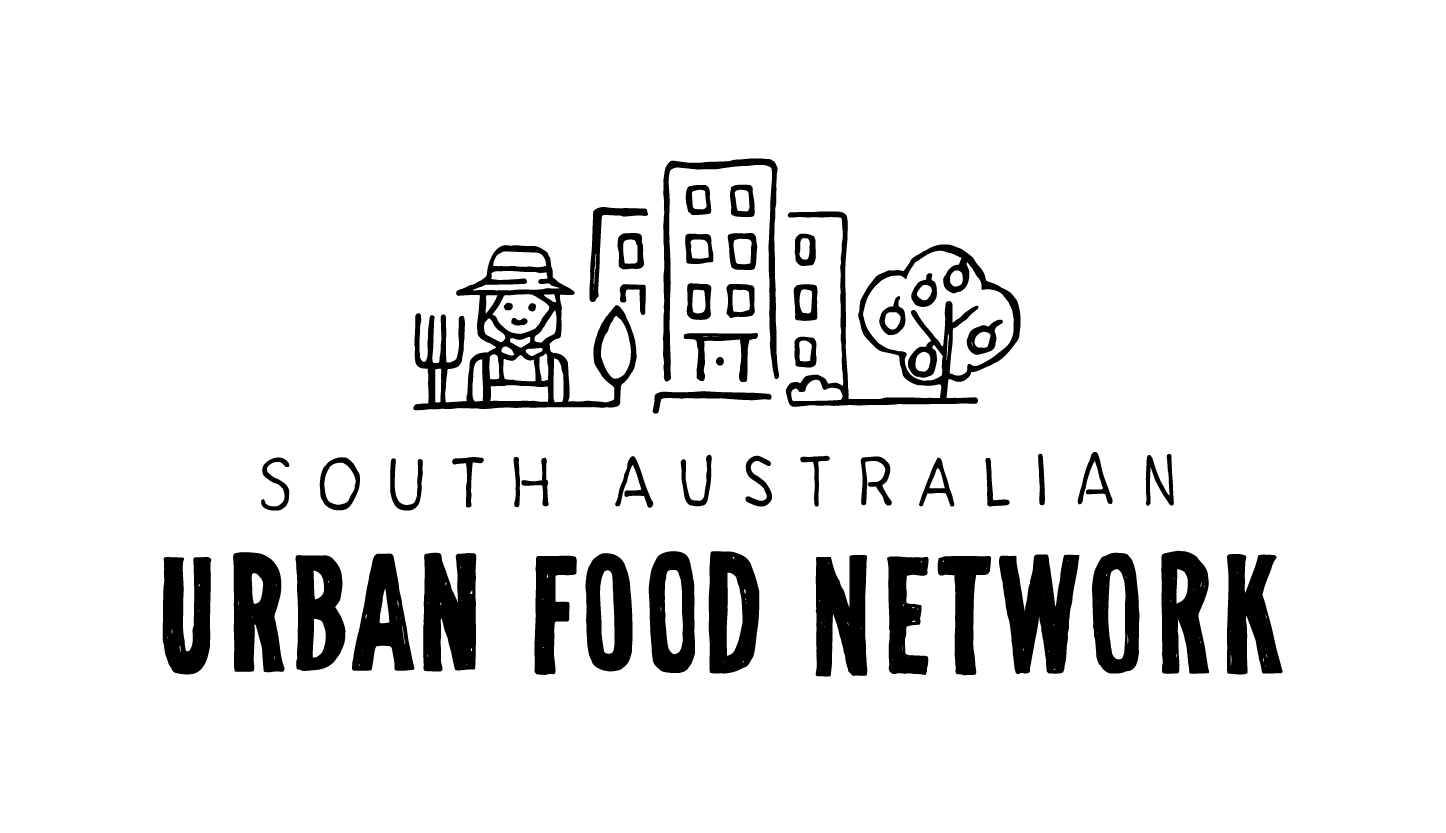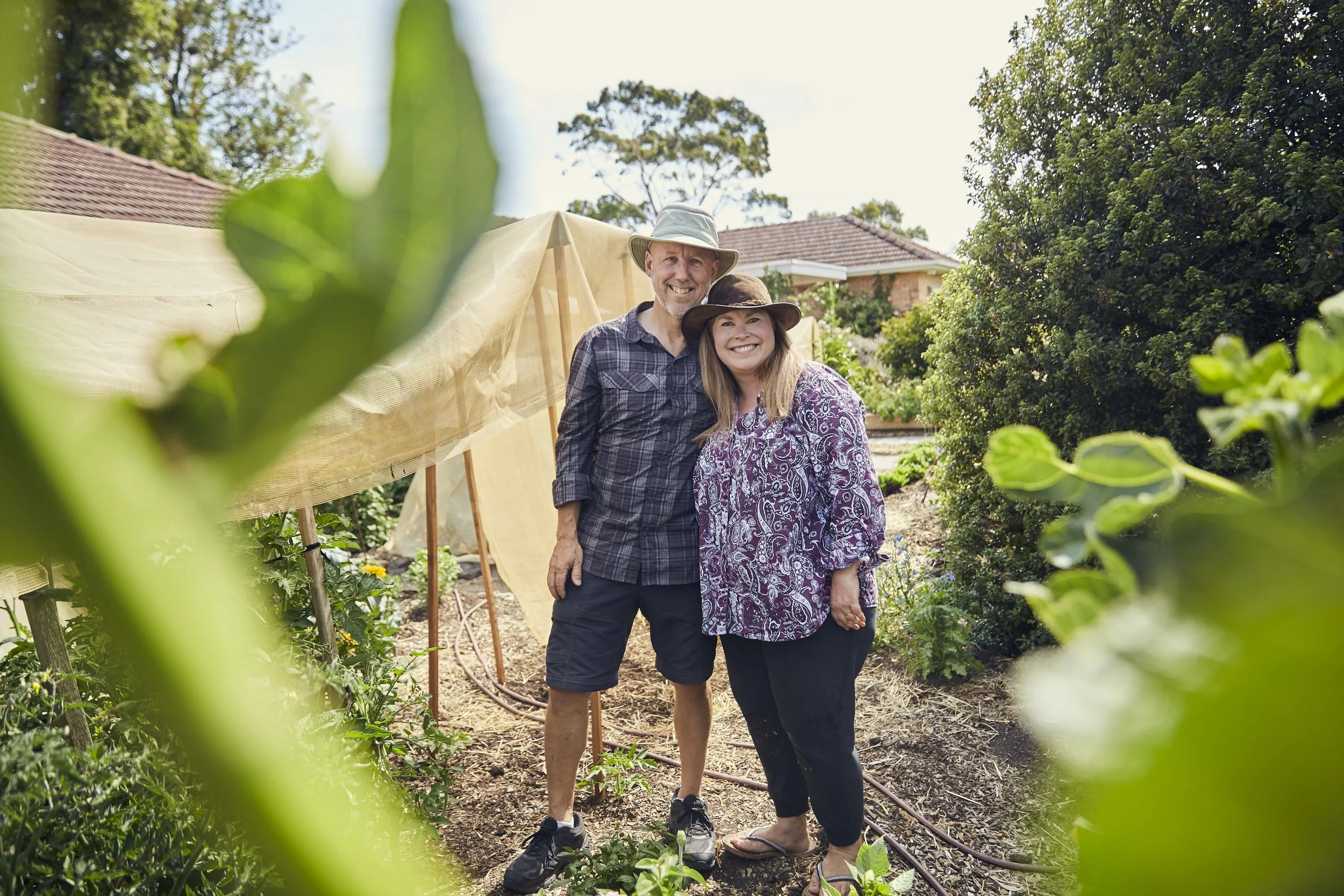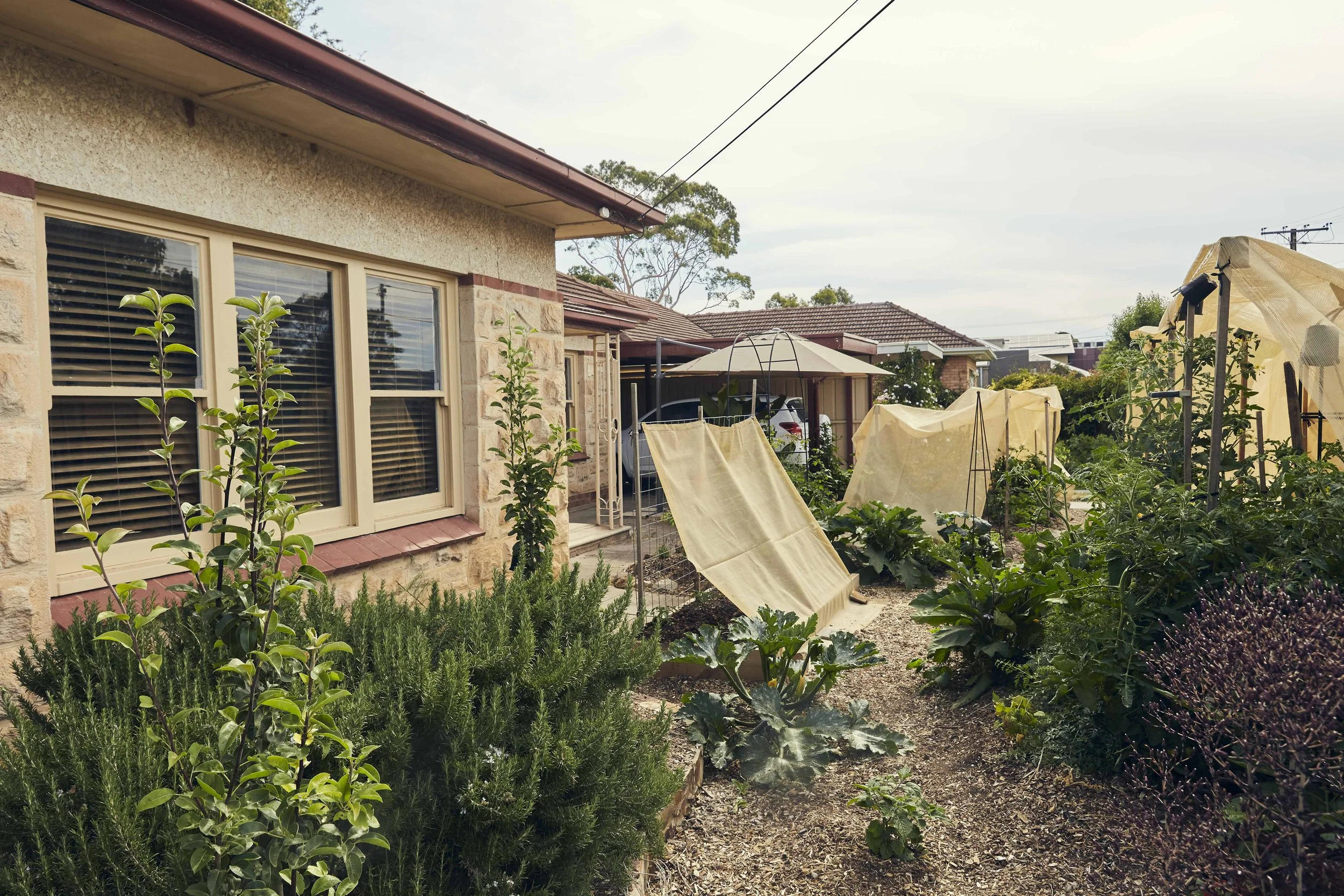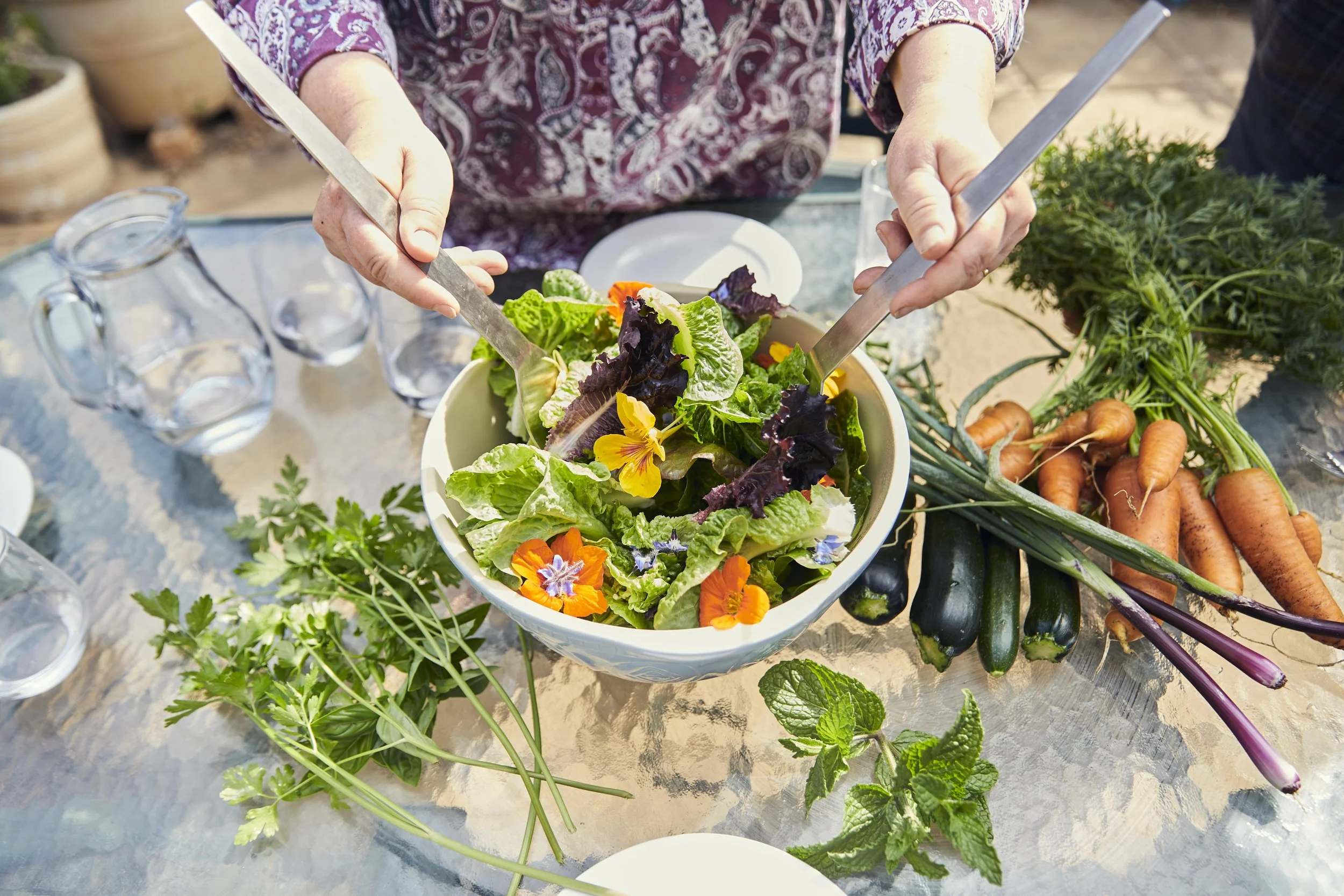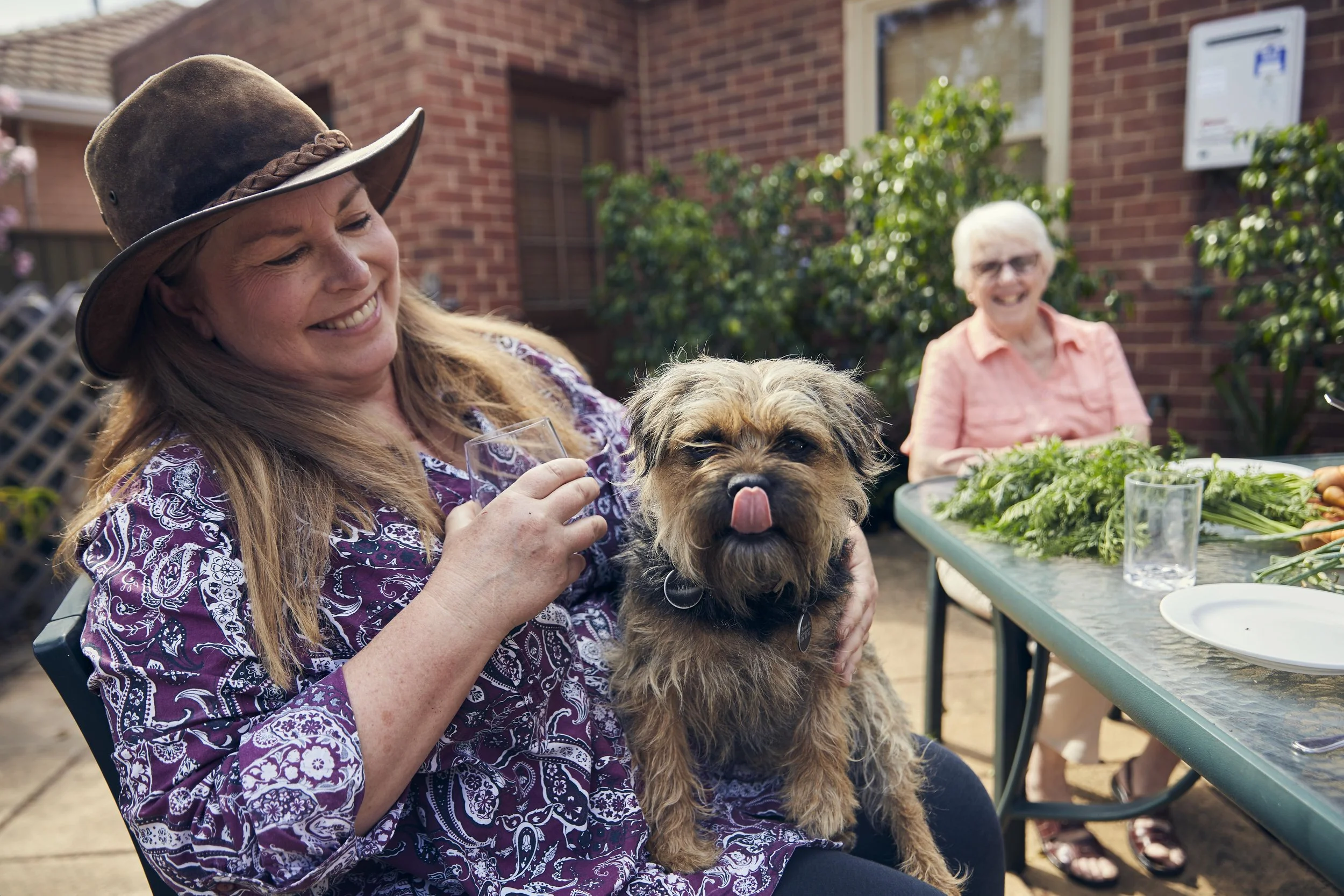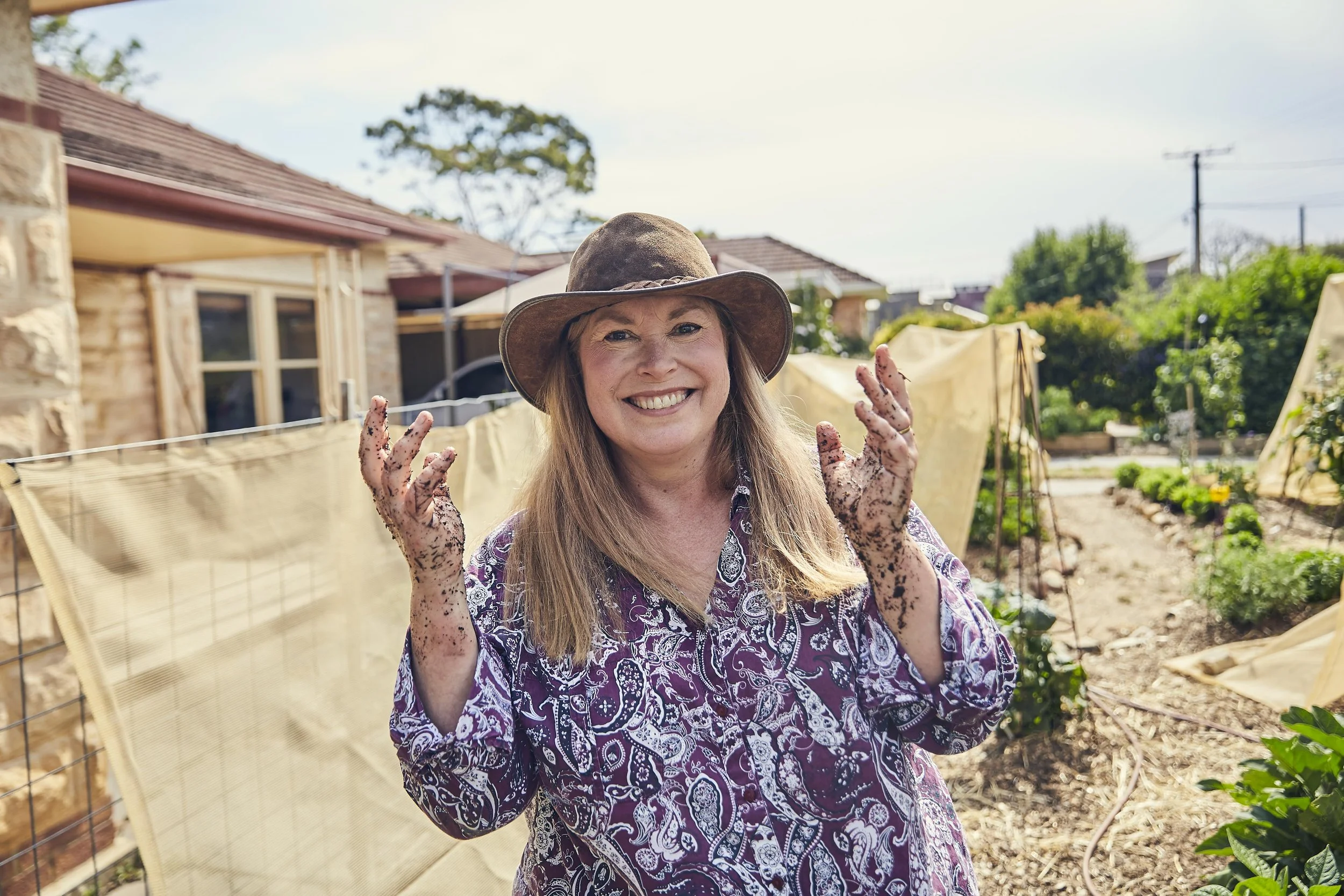Mijbil Urban Farm – Glengowrie, Adelaide
Not too far away from one of Adelaide’s most popular beaches lies Mijbil Urban Farm, located in suburban Glengowrie. The family home and farm celebrates bringing the garden to the front yard where the community can best enjoy it. Here we talk with Lynne Gunn about growing food for her neighbours, the no-dig method and the fun of keeping a “paramilitary chook!”
The key stat
Year established: Sometime 30 years back!
Location: Glengowrie, about 12kms south-west of Adelaide’s city centre.
Land size: Suburban house and garden. They use 20sqm beds for annual plants, 150sqm for fruit trees, berries, perennials and ornamentals plus the chooks enjoy a chook run that’s around 24sqm.
Soil type: Sandy loam that goes down to clay if you dig down far enough.
Main energy sources: Mains power, looking to invest in solar.
Main water sources: At the moment still on mains water, looking to install rainwater tanks.
Main production: Eggs, the usual fruit and veg, and almonds.
Labour: Michael and Lynne look after the garden, with Michael’s dad stepping in when the couple is away.
What’s the project, in a nutshell?
Lynne and Michael have lived in their home at Glengowrie for over 30 years, raising their two sons, fostering a menagerie of pets, and gradually turning their suburban block into an urban oasis.
Over time, their home has become an urban farm, growing seasonal produce to feed their family and neighbours.
The farm is named after Lynne’s border terrier dog, Mijbil. A love for animals has been a guiding ethos for Lynne, as well as the permaculture tenets of People Care, Earth Care, and Fair Share.
The family has had a flock of chickens in residence for the past 15 years. The current flock is the treasure of the garden, lovingly called The Mijbil Rainbow Flock, and they live in a retrofitted cubby house.
“I have Araucanas, brown and white Hy-lines and Australorps, and they bring life to the garden,” Lynne says.
Lynne has one chook in particular that rose to chicken stardom. This black Australorp, named Mrs Bennett, described as a “paramilitary chook,” devoted her life to terrorising Lynne, sneaking around corners to peck her, undoing her shoelaces and generally dominating the flock.
The dear Mrs. Bennett developed her own fanbase on Facebook as Lynne often live-streamed the coop.
“She passed away a few weeks ago, aged five years, and her fans miss watching me fend her off with my “Chicken Sword”. These are special little creatures and they deserve the best care you can give,” Lynne says.
Michael is a keen beer brewer and the couple see their passions align when the spent grains from the brewing process can be used as a treat for the chooks to eat.
He is also a whiz in the kitchen and adds kombucha, relishes and passata to the couple’s repertoire of skills.
“He has adapted well to me becoming vegetarian and things have never tasted so good!” Lynne says.
The initial plan to gradually build their self-sufficiency and sell any excess produce at the front gate quickly became sidetracked since the pandemic outbreak.
“Suddenly it became more important to help our community by donating produce to our neighbours, family and friends, particularly the elderly who have been isolated for many weeks,” says Lynne.
This piqued their interest in not only providing produce to their community, but helping others to grow their own.
“I guess you could say we’ve shifted our focus from self-sufficiency to developing community-based sufficiency.”
Having a garden in her front yard is important to Lynne as it creates a special space for connection with the community.
Now Lynne is able to have her garden out in full view, she enjoys watching her neighbours wander in and pick their dinners.
To encourage community spirit, Lynne has told her neighbours they are welcome to come into the front garden and harvest fresh produce.
“My next door neighbour Paul kindly mows our “lawn” on the front verge in exchange for eggs and vegetables. His little grand nephew also enjoys “food hunting.”
How did all this get started?
Lynne’s passion for gardening was sparked at the age of 12 after her father brought home a copy of Esther Deans’ Gardening Book: Growing Without Digging.
“This was quite revolutionary for my father, who until then had been a very traditional gardener; one who tilled the earth and sprayed everything with poison,” Lynne says.
She remembers her parents as novices to growing vegetables, but she and her father transformed a small part of their beautiful backyard into a productive garden.
Tucked out of sight, Lynne was allocated her small allotment to grow to her heart’s content.
“Dad and I sheet mulched the lawn and built raised garden beds, layering them with lucerne hay, straw, manure and compost. We used herbs as companion plants. The vegetable production was phenomenal.”
Since then, Lynne has been hooked.
When she stumbled across permaculture in later life, she felt an instant recognition and connection.
Any tips for those wanting to start something similar?
Lynne’s key advice is to start a small project while you plan a larger overall concept.
“This could be as simple as growing a planter of herbs and starting a compost bin, while evaluating which areas would be best for planting.”
She also suggests doing plenty of research and asking lots of questions, but at the end of the day backing your own judgement.
“What works for one person doesn’t necessarily work for others, so if you think you’ve come up with a new idea, give it a go.”
“Even if it doesn’t work out perfectly, you’ll have gained some experience that might lead to other opportunities.”
Lynne and Michael attended a Living Smart course two years ago, which helped them draw on inspiration and knowledge in their community.
“We were delighted to find like-minded people who also wanted to live more lightly on our planet. We decided it was time to up our game in many ways.”
One way to take the next step in your garden is to increase your growing space. Often this means removing a quintessential feature of the Aussie front yard – the lawn.
Lynne and Michael sourced most of what they needed to achieve this project for free, finding cardboard from retail businesses and green waste from supermarkets.
“We cut the lawn very short and sprinkled it with lime and blood and bone. We then put two layers of wet overlapping cardboard down.”
With the teachings of Esther Deans guiding the way, they added the likes of lucerne hay, cow manure, and then straw. After a layer of compost and woodchips, they were ready to grow.
“This is a no dig system – if you till the chips into the compost, you’ll lock up the nitrogen. So just keep adding mulch and compost to the top.”
Once a complex fungal system brings everything together as the wood chips break down, you’ve effectively created your own forest floor!
“In terms of planting, get your fruit trees in first, as they take the longest to crop,” Lynne says.
She also recommends researching when different varieties fruit, so that you can have a crop most of the year.
Mijbil Urban Farm now has peaches, pears, apricots, apples, persimmons, almonds, mandarins, lemons, limes, kumquats, figs, blueberries, strawberries, raspberries, bananas, passion fruit and grapes, as well as annual crops.
Chickens are a great addition to a home garden and will aid by eating kitchen scraps, making manure for compost and providing eggs.
Be prepared to look after your feathered friends though.
“They need shade, cool clean water and predator-proof coops with plenty of room,” says Lynne.
While waiting for your delicious food to grow, learn new skills for preserving your harvest. Learn to pickle, preserve, ferment and dehydrate your surplus to use in lean times.
What’s been the biggest challenge so far?
Coping with the scorching summers has been a challenge in the past and Lynne says that Adelaide’s 2019 searing summer heatwave was particularly tough going.
Their no-dig style of garden helped to retain soil moisture and, after adding many shade cloths, Lynne is happy to report that they didn’t lose any plants.
“We will be putting up more permanent fixings for shade this year well in advance. Wrestling with nine metres of shade cloth in 45-degree heat and strong winds will test any couple’s relationship to the max!”
Lynne says in terms of making a living, she’s not generating much in cash terms but finds a wealth of benefits nevertheless.
“I am rewarded with extra time, fresh ingredients, and a connection with my local community that I didn’t have before I started marching about the front garden in my gum boots.
“I’m not making a living as much as I’m making a better life.”
Security isn’t something Lynne often dwells on, but it is a reality for a front yard garden.
“I do appreciate a knock on the door from people I don’t know who would like to enjoy the garden from my side of the fence,” she says.
Mijbil, the terrier, is head of security and vigilant to alerting the family if anyone enters their property.
“Unfortunately Mij was away on holidays during The Great Mandarin Heist, which has been our only disappointing moment with regard to our honour system.
“A man with a bag stripped our entire mandarin tree. Perhaps he needed them. I guess if that’s the worst thing that ever happens, we can live with it.”
Now the family has secured the annual beds in the backyard, they expect to have enough for themselves and can focus on providing more public picking areas out the front.
“Most people are honest and are emotionally invested in watching our little farm grow,” Lynne says.
Just to be on the safe side, Lynne also has solar powered security cameras continuously running so she can log in remotely and check on the chooks and property from wherever she is.
What’s the best part?
“I enjoy watching people stopping to exclaim over vegetables they’ve never seen growing before, and letting little children pick and eat fruit and vegetables straight from the garden,” Lynne says.
Before the COVID-19 pandemic, the residents from the local nursing home would include Lynne’s garden on their daily walk, gathering in the driveway, surreptitiously pinching her figs and roses. Lynne says she never minds as they have plenty to share. She looks forward to when the passersby return.
During the pandemic, Lynne reflects that having their own food security has kept them calm while many have felt panic. They’ve found comfort in being able to supply food to friends and have been deeply touched by a newfound friendship between their eldery neighbour and the chooks.
Their neighbour, who is lonely in isolation, sits next to the fence so she can listen and be soothed by the sound of the chooks going about their business.
“I’ve inspired many friends to start their own gardens and to keep chooks, and the photos they send me of their efforts spur me on to continue sharing this way of life.”
The farm also helps Lynne start her day feeling grounded and connected to nature before slowly slipping into a regular work environment.
“My mornings are very grounded, as before work I tend to The Mijbil Rainbow Flock, hand feeding them and collecting the gorgeous eggs that are all different colours: blue, brown, green and white.
“Picking herbs and greens to eat with the eggs for breakfast all helps to make me feel more connected with nature.”
After a long day trapped inside at work, it is wonderful to come home to our own little oasis,” Lynne says.
She’s planted strawberries along the path to the front door, and enjoys the ritual of pausing to pick the sweet, sun-warmed berries as the short walk transitions her from a stressful workplace to a sanctuary of peace.
Lynne has recently retired after working in community pharmacy for nearly 20 years, deciding to focus on the garden and a writing project.
While working she kept the garden low maintenance with wood chips covering most of the bare soil in the front yard. This style of mulching keeps the weeds and watering to a minimum.
“Michael has been working tirelessly over the past few months building new raised beds and new compost bins. He retired a few years ago and this healthier lifestyle clearly agrees with him,” Lynne says.
With the extra time on her hands the garden will flourish and already the couple have been busy making design alterations throughout the backyard.
“We moved all of our intensive raised beds for annual vegetables into the newly built Mrs Bennett Memorial Chicken Pavilion in the backyard and they are quite high so that we can continue to garden even with bad backs!”
Tell us about the future - what’s next?
“I think after the stresses of 2020, many of us will be reevaluating our future and lifestyle.”
Lynne is taking long service leave after working in community pharmacy for 18 years.
She’s also planning improvements to her own patch.
“Our plans include improving the chicken coop, creating easier access to our many compost bins, adding water tanks and solar panels, and improving our planting succession timetable.”
Lynne and Michael have been keeping notes on what’s happened in the past year so they can learn and do better in the future.
“A friend is starting her own vegetable garden, and we are planning to collaborate to produce a diverse selection of crops we can all share. Hopefully it will inspire more people to start growing,” Lynne says.
“I’m hoping that when we all come out of isolation, many of us will reconnect in our gardens and kitchens.”
Ways to get in touch
Facebook: @MijbilUrbanFarm
